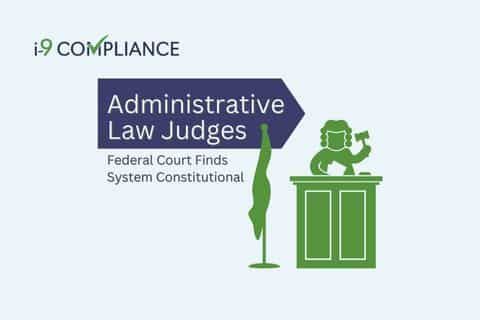Federal Court Finds System of Administrative Law Judges Constitutional

August 10, 2023
The U.S. Department of Labor’s (DOL) administrative law judge system recently received backlash due to a case concerning a New Jersey farm owner. This backlash challenged the system’s constitutionality, though the DOL’s system appears to have prevailed. According to Judge Joseph Rodriguez, “the clear language of the statute, Congress authorized the DOL to adjudicate civil monetary penalties or back pay in administrative proceedings.”
This case began after an administrative law judge ruled that the plaintiff violated the H-2A provisions of the Immigration and Nationality Act (INA). Due to this ruling, the plaintiff had to pay $344,945 in back wages and $211,800 in civil penalties. The DOL’s Administrative Review Board then affirmed this decision.
In response, the plaintiff filed a lawsuit in the U.S. District Court for the District of New Jersey. This suit challenged the DOL court’s very constitutionality under Article III. This lawsuit followed a recent ruling by the U.S. Supreme Court against the Environmental Protection Agency, which limited federal agencies’ regulatory power.
The plaintiff argued that the DOL’s adjudication of its claims before agency courts and judges violates Article III of the Constitution. Under Article III, “The judicial power of the United States shall be vested in one Supreme Court, and in such inferior courts as the Congress may from time to time ordain and establish.”
As such, the plaintiff argued such judicial power could not confer on entities outside Article III. However, the court rejected this argument. Congress granted the power to regulate immigration, such as the admission of aliens, and the ability to impose sanctions. Congress also empowered administrative officials to enforce the rulings.
The plaintiff then argued that Congress had not provided for the DOL to adjudicate this case. However, the court pointed to the plain text of the INA, which states:
“The Secretary of Labor is authorized to take such actions, including imposing appropriate penalties and seeking appropriate injunctive relief and specific performance of contractual obligations, as may be necessary to assure employer compliance with terms and conditions of employment under this section.”
As such, the Secretary of Labor may impose penalties like the one in this case. Furthermore, 5 USC 301 authorizes the Secretary to “prescribe regulations for the government of his department.” The Secretary exercised this power to allow dissatisfied H-2A violators to challenge assessments and petition for review in an adjudicator process. As a result, the court found that the DOL’s system of administrative law judges is constitutional and provided for by statute.
This case reminds all employers of the importance of complying with the INA. However, one regulation employers struggle with is the anti-discrimination provisions associated with the employment eligibility verification (Form I-9) process. One way to ensure compliance is by incorporating an electronic I-9 management system. This system guides employers and personnel through the process. It also provides reminders of when to take action.
When it comes to your employees, automation makes eligibility verification quick and simple. Ensure compliance today with I-9 Compliance.